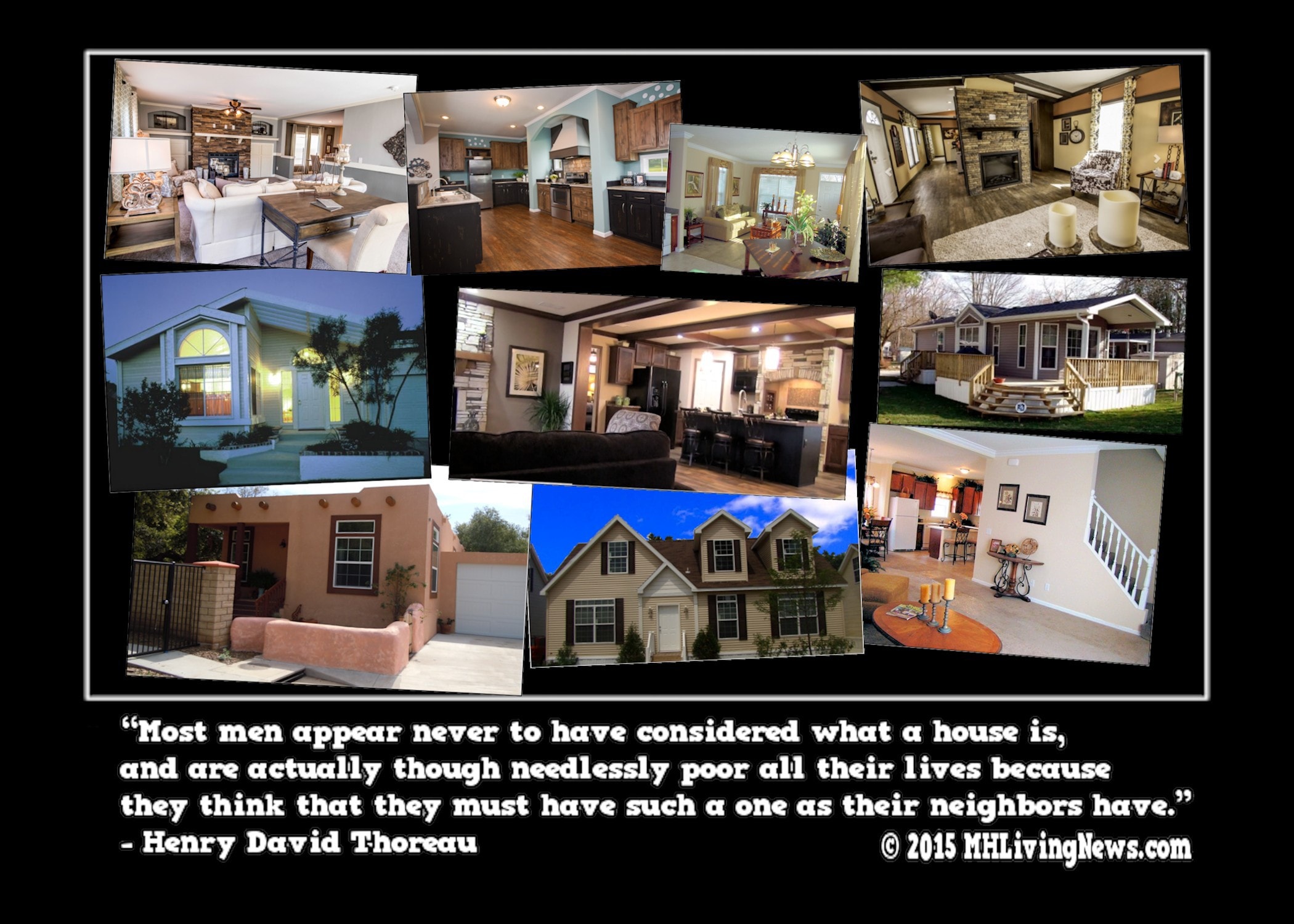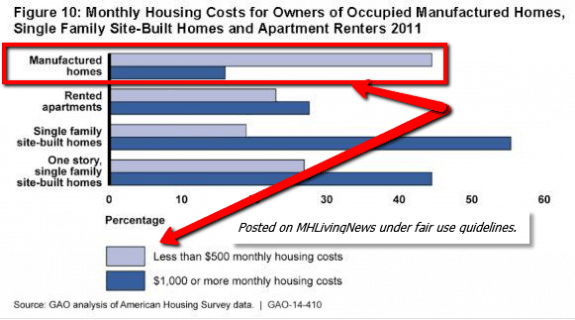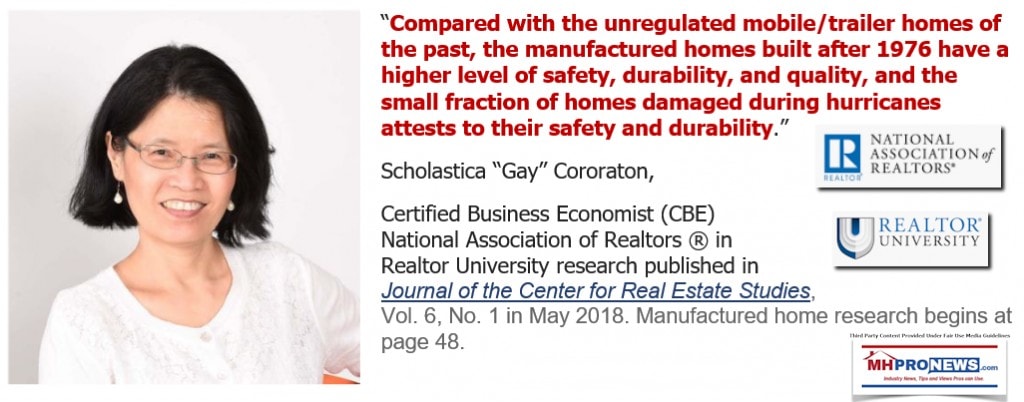500-word Executive Summary. Decades of third-party research from the late 20th century and throughout the 21st century demonstrate that HUD Code manufactured homes are the most proven form of affordable housing in U.S. history. Nevertheless, concerns and confusion about manufactured homes and industry brands exists. Evidence and applied common-sense suggest that several brand-related concerns are valid. Mainstream media reports often use terminology such as “predatory” about ‘leading brands’ in manufactured housing. Legitimate concerns should legally address problems for the sake of millions of consumers and substantial numbers of ‘white hat’ manufactured home brands.
The facts here will point to solutions to ‘predators’ without harming honest businesses that can honorably solve help solve the affordable housing crisis.
By citing existing laws and solid research, this resource provides actionable insights.
Links to new data emerging after this report is published are provided.
Research spotlight manufactured housing:
- Fire safety compared to conventional housing.
- Tornado and windstorm safety.
- Appreciation/depreciation research and concerns about the impact of manufactured homes on conventional housing values.
Federal laws – cited herein – were passed by widely bipartisan margins. That means there is no need to wait for new laws. But these good laws are widely acknowledged to be improperly enforced.
Additionally, Congress probed issues about enforcement of existing laws, referenced below.
These and other topics explore the downloadable reports, illustrations, and links to predominantly third-party to manufactured housing research.
This MHLivingNews report thus becomes the most complete resource for facts, evidence, and studies known to exist anywhere online.
Note the research cited will by year, not necessarily based upon the importance of the findings.
Some might be tempted to think that reports more than a few years old are not relevant, but that would be mistaken. Why? Because HUD Code manufactured housing established proven standards updated in 2000, but even prior standards produced the largely glowing results third-party studies proclaimed.
Other than “predatory” and troubling brand-related claims – that often trace back to what might be called ‘the usual suspects’ – these facts and evidence about manufactured housing demonstrate the test of time.
Additionally, examining these research resources, solutions to several vexing problems caused by predatory organizations – and actionable solutions to the affordable housing crisis – will come into sharper focus.
- Enforcing existing laws could rapidly advance the need for affordable housing in America.
- Enforcing existing laws could stymie the ‘usual suspects’ who have steadily consolidated manufactured housing while generating a steady stream of troubling headlines.
Obviously, prices change generally upward on all types of housing. That said, the percentage of saving possible by buying a HUD Code manufactured home has been surprisingly steady.
This list of reports, abstracts, and evidence also link additional resources to expert analysis of these documents.
For those outside of manufactured housing looking in, this resource may produce this surprising insight.
There is much more credible, independent and largely positive research about HUD Code manufactured housing than many might have believed prior to seeing this resource.
With that introduction, and some related illustrations, let’s begin.
Note several illustrations shown herein – like the photo collage below – can be opened to show a larger size.
Click the image and follow the prompts. To return to this page, use your browser back or escape key.



Ongoing sources for new manufactured housing data:
- New Monthly Manufactured Home Production and Shipment Data (Manufactured Housing Association for Regulatory Reform (MHARR), using official data collected for HUD).
https://manufacturedhousingassociationregulatoryreform.org/category/manufactured-home-shipments/
- Periodically updated U.S. Census Bureau Manufactured Housing Survey – Pricing, Totals, Sizes, Regional and National Data:
https://www.census.gov/programs-surveys/mhs.html

Research and Reports by Year and Source of the Studies/Reporting.
1997 – Joint Center for Housing Studies Harvard University – The Future of Manufactured Housing Kimberly Vermeer Josephine Louie
“Manufactured housing has its roots in the recreational vehicle industry: in early years manufactured homes were mobile and temporary. Today, manufactured housing is occupied by millions of households on a year-round basis. One of the most remarkable aspects of the manufactured housing industry is its rapid evolution over its short history.” This research includes a useful history of the evolution from trailer houses to mobile homes to early manufactured housing and modern manufactured homes.
2000 – HUD Trends in Factory Built Housing. Cites the Vermeer and Louie Harvard research above and other sources. While much of the information is on manufactured housing, other forms of factory building – such as modular housing – are examined too.
May 2000 then Harvard’s JCHS Executive Director Eric Belsky was cited by Modern Homes Development – then Executive Director of the Joint Center for Housing Studies (JCHS) at Harvard University “there are multiple reasons to expect manufactured housing to do better than site built housing in the decade.” Meaning, by 2010, Belsky – who’s research made him quite aware of the manufactured housing credit and repo crunch post-1998, nevertheless still projected that HUD Code manufactured homes would overtake conventional housing. Why? Because the quality for manufactured homes was there, plus there was – and remains – a growing affordable housing crisis. See related report and analysis linked here and below.
September 2000 – The Impact of Manufactured Housing on Adjacent Site-Built Residential Properties in Two Alabama Counties. This produced a similar result to later research reported by HUD on manufactured housing appreciating about similar rates to conventional housing in the same neighborhoods. That more recent research is shown below and was conducted in 3 different urban areas in different parts of the U.S. Restated, manufactured homes have no apparent negative impact on appreciation for conventional housing. Significantly, such academic research has been known for decades, despite common beliefs to the contrary.
- Charles E. Hegji Auburn University
- Montgomery Linda G. Mitchell Auburn University Montgomery
2001 – “Why Advocates Need to Rethink Manufactured Housing Fannie Mae Foundation, Richard Genz.
A report and analysis on the above is found in the article linked below.
https://www.manufacturedhomepronews.com/why-advocates-need-to-rethink-manufactured-home-quality-harvard-gse-genz-high-satisfaction/
September 2002 – An Examination of Manufactured Housing as a Community- and Asset-Building Strategy Report to the Ford Foundation by Neighborhood Reinvestment Corporation In collaboration with the Joint Center for Housing Studies of Harvard University by:
- William Apgar, Joint Center for Housing Studies
- Allegra Calder, Joint Center for Housing Studies
- Michael Collins, Neighborhood Reinvestment Corporation
- Mark Duda, Joint Center for Housing Studies
January, 2011. Regulatory Barriers to Manufactured Housing Placement in Urban Communities HUD PD&R.
Prepared for U.S. Department of Housing and Urban Development Office of Policy Development and Research [PD&R] Prepared by Center for Housing Research Virginia Tech Blacksburg, Virginia
Beyond the acknowledgement of regulatory barriers limiting the placement of HUD Code manufactured home is the fact that in several municipal areas examined, manufactured homes and conventional housing appreciated side-by-side. Meaning, conventional housing values were not harmed by the close proximity of manufactured homes. Also, manufactured homes and conventional housing both appreciated.
July 17, 2014 – Foremost Insurance research of manufactured home owners.

July 2014 Manufactured Housing – Government Accountability Office research on HUD’s effectiveness in implementing the Manufactured Housing Improvement Act (MHIA) of 2000.
“This report addresses, among other things, the extent to which HUD has met key purposes of the 2000 Act and assesses whether user fees cover program costs. GAO interviewed and collected data for 2000-2013 from HUD, other agencies, and industry groups. GAO also visited large and small plants that built manufactured housing to solicit industry perspectives.”
“HUD agreed with the first recommendation and partially agreed with the next two because it believes it has already taken actions. HUD stated it would consider the last recommendation. GAO continues to believe these recommendations remain valid as discussed in the report.”
Among the takeaways was that even with higher interest rates, manufactured homes are the most affordable kind of housing. But pause and consider that some 14 years after the MHIA was enacted, the GAO said that the reform law was not being fully and properly enforced by HUD.
“Facilitate the availability of affordable manufactured homes. Owners of manufactured homes have lower monthly housing costs than site-built owners and apartment renters, but high financing costs often keep these homes from being even more affordable.”
September 2014 – Manufactured-housing consumer finance in the United States, by the Consumer Financial Protection Bureau (CFPB). Note that footnote #15 specifically references Manufactured Home Living News (MHLivingNews).
November 2014 – National Fire Protection Association (NFPA) – manufactured home safety compared to mobile homes and conventional housing.
This report addresses, among other things, the extent to which HUD has met key purposes of the 2000 Act and assesses whether user fees cover program costs. GAO interviewed and collected data for 2000-2013 from HUD, other agencies, and industry groups. GAO also visited large and small plants that built manufactured housing to solicit industry perspectives
2015 Examining Community Attitudes Toward Manufactured Housing
Lisa Tyler (doctoral dissertation, she is now Lisa Tyler, Ph.D.)
Walden University
From the Abstract: “Despite the need for affordable housing, consumers have failed to recognize
manufactured housing as a viable alternative to site-built housing. The decline in market share for manufactured housing and subsequent decrease in sales has threatened the sustainability of manufacturers, retailers, suppliers, and support organizations. The purpose of this correlational study was to determine the extent that respondents’ demographic and socioeconomic characteristics, perceptions of manufactured home characteristics, and perceptions of manufactured home occupants and neighborhood characteristics predicted the acceptance of manufactured homes.”
In her acknowledgements: “I would like to acknowledge the manufactured housing industry professionals who have supported and assisted me throughout this journey. I am incredibly appreciative of Tony “L.A. Tony K” Kovach’s insight, feedback, and valuable opportunities to generate interest and support for my research topic. I am an honored recipient of your generosity in sharing your extensive knowledge and experience.”
MAY 2018 – Realtor University – Richard J. Rosenthal Center for Real Estate Studies
THE MARKET FOR MANUFACTURED HOMES (Page 48-86)
Scholastica (Gay) D. Cororaton,
CBE Research Economist, National Association of REALTORS®
Page 48-86.
“Compared with the unregulated mobile/trailer homes of the past, the manufactured homes built after 1976 have a higher level of safety, durability, and quality, and the small fraction of homes damaged during hurricanes attests to their safety and durability. New design features and multi-section homes are increasingly giving them the look of traditional site-built homes. These safety standards and improved features should lead to the increasing acceptance of manufactured homes as a safe, durable, and affordable type of housing.”
Note: on page 48, footnote number 1 acknowledges the contributions of MHProNews/MHLivingNews publisher L. A. “Tony” Kovach to Scholastica “Gay” Cororaton, CBE research report. Cororaton’s research includes this insightful statement.
Jan 29, 2018 — Manufactured homes could ease the affordable housing crisis. So why are so few being made? “Manufactured housing is the least expensive type of housing, but its annual production is low in recent years.”

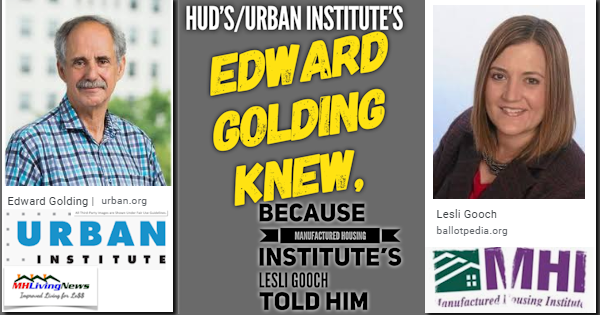
Sep 13, 2018 — New evidence shows manufactured homes appreciate as well as site-built homes.
May 7, 2019 — Dr. Ben Carson Secretary of Housing and Urban Development … Manufactured housing has emerged out of the limestone and stepped into the limelight. Dr. Carson address cites numerous surprising facts about manufactured housing appreciation, resilience in windstorms, and usefulness in building generational wealth and more.
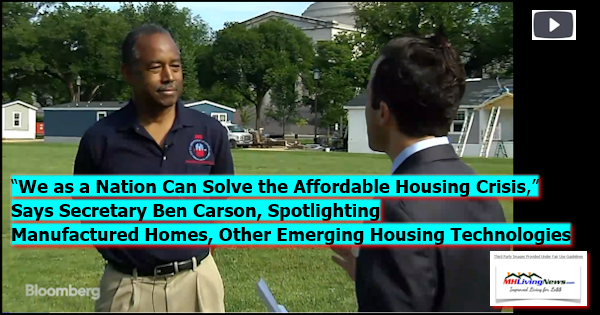
August 14, 2020 Monopolies: Silent Spreaders of Poverty and Economic Inequality by JAMES A. SCHMITZ JR., DAVID FETTIG (Minneapolis Federal Reserve researchers).
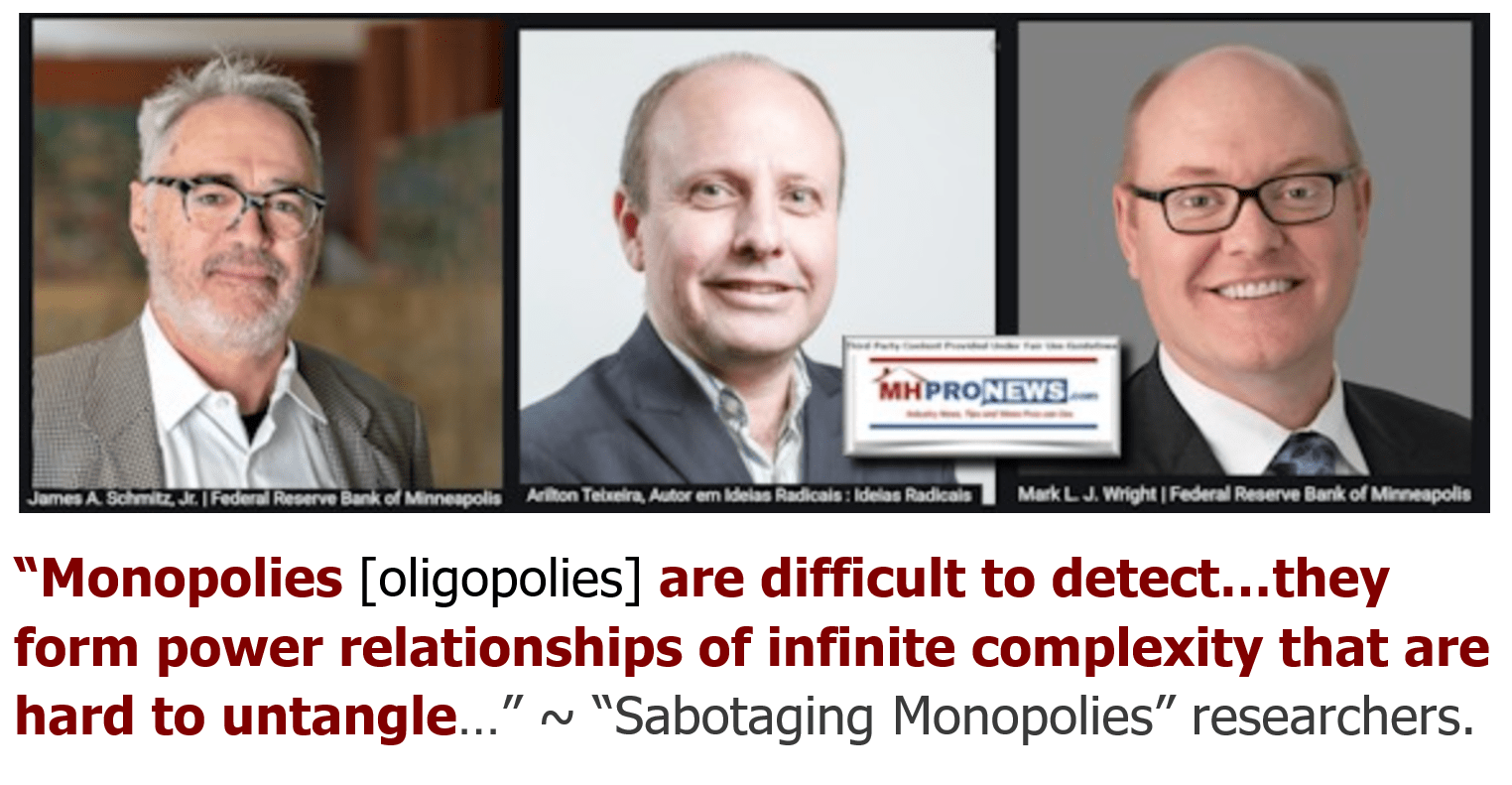
May 2021 – Manufactured Housing Finance: New Insights from the Home Mortgage Disclosure Act Data – by Consumer Financial Protection Bureau (CFPB).


On 9.7.2021 HUD’s Pamela Blumenthal and Regina Gray published this report.
Sep 7, 2021 Opportunities to Increase Housing Production and Preservation – In this article, Pam Blumenthal and Regina Gray discuss the impact of regulatory barriers on housing affordability. That HUD report makes a stunning admission
“Federally sponsored commissions, task forces, and councils under both Democratic and Republican administrations have examined the effects of land use regulations on affordable housing for more than 50 years. Numerous studies find land use regulations that limit the number of new units that can be built or impose significant costs on development through fees and long approval processes drive up housing costs. Research indicates higher housing costs also drive up program costs for federal assistance, reducing the funds available to serve additional households.”
Marketplace did a recent report that aptly noted that most conventional builders are ‘throttling’ home sales. The reasons to do so are many, from a builder’s perspective. But the impact is insufficient new housing production. Further, numerous sources have observed that only factory home building can close the demand vs. supply gap. Which goes to the rationale behind Dr. Carson’s 2019 statements above.
More Facts, Insights, Analysis and Commentary 21st Congressional Action & Related
A) Congress has been aware of the problems of affordable housing, and they passed legislation that aimed to fix the affordable housing crisis when in 2000 they enacted the Manufactured Housing Improvement Act of 2000 (MHIA). The 2000 reform act specifically said this was an affordable housing law.
https://www.govinfo.gov/content/pkg/USCODE-2012-title42/html/USCODE-2012-title42-chap70-sec5401.htm
B) Congress also had manufactured homes specifically in mind when the Housing and Economic Recovery Act (HERA) of 2008 enacted as provision the Duty to Serve Manufactured Housing (DTS), rural and underserved markets. But a look at the Lincoln Land Policy site reveals that 13 years after DTS was enacted, it is still not being properly enforced.
Keep in mind that those who signed onto that coalition included MHI members and periodic coalition partners. But MHI itself did not sign on. Why?
C) There are two primary national trade organizations serving manufactured housing professionals. One is an ‘umbrella’ group that says of themselves that they serve “all segments” of manufactured (and modular, factory built, etc.) housing. That’s the Manufactured Housing Institute (MHI). Then there is the Manufactured Housing Association for Regulatory Reform (MHARR). MHARR says that they are an independent HUD Code manufactured home producers trade group. Zoning, placement, finance – these are post-production issues. So, one might presume that MHI would be taking point. Objectively, MHI and MHARR in their various comments letters to federal officials say superficially similar things.
D) But despite MHI’s claims, there is growing evidence that the trade group is adding to the affordable housing crisis by favoring a status quo that fosters consolidation.
From the FHFA website:
https://www.fhfa.gov/Videos/Pages/FHFA-Public-Listening-Session-Enterprise-Housing-Goals-ANPR.aspx
Written Remarks by Mark Weiss (3/25/2021)
Written Remarks by L. A. “Tony’ Kovach (3/25/2021)
https://www.fhfa.gov/Media/Documents/Kovach-statement.pdf
Kovach’s remarks built on remarks delivered in person in Washington, D.C. to FHFA officials in December 2019. They are linked from the above on the FHFA website.
E) Let’s boil some of this down to that last document which was meant to be a resource for researchers. Much of this affordable housing crisis comes down to a lack of production. But why? The solutions are known, as Blumenthal and Gray noted for HUD. To that point, the MHIA – 3 years after it was enacted – had Democratic lawmakers asking a Republican HUD Secretary to enforce its “enhanced preemption” provision. The letter linked below is not easy to find, so here it is:
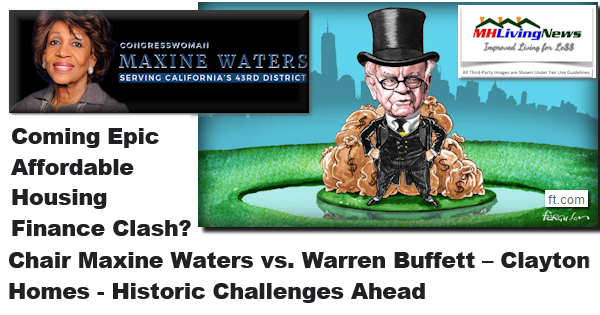
From the above are these closing comments, which MHProNews highlighted.
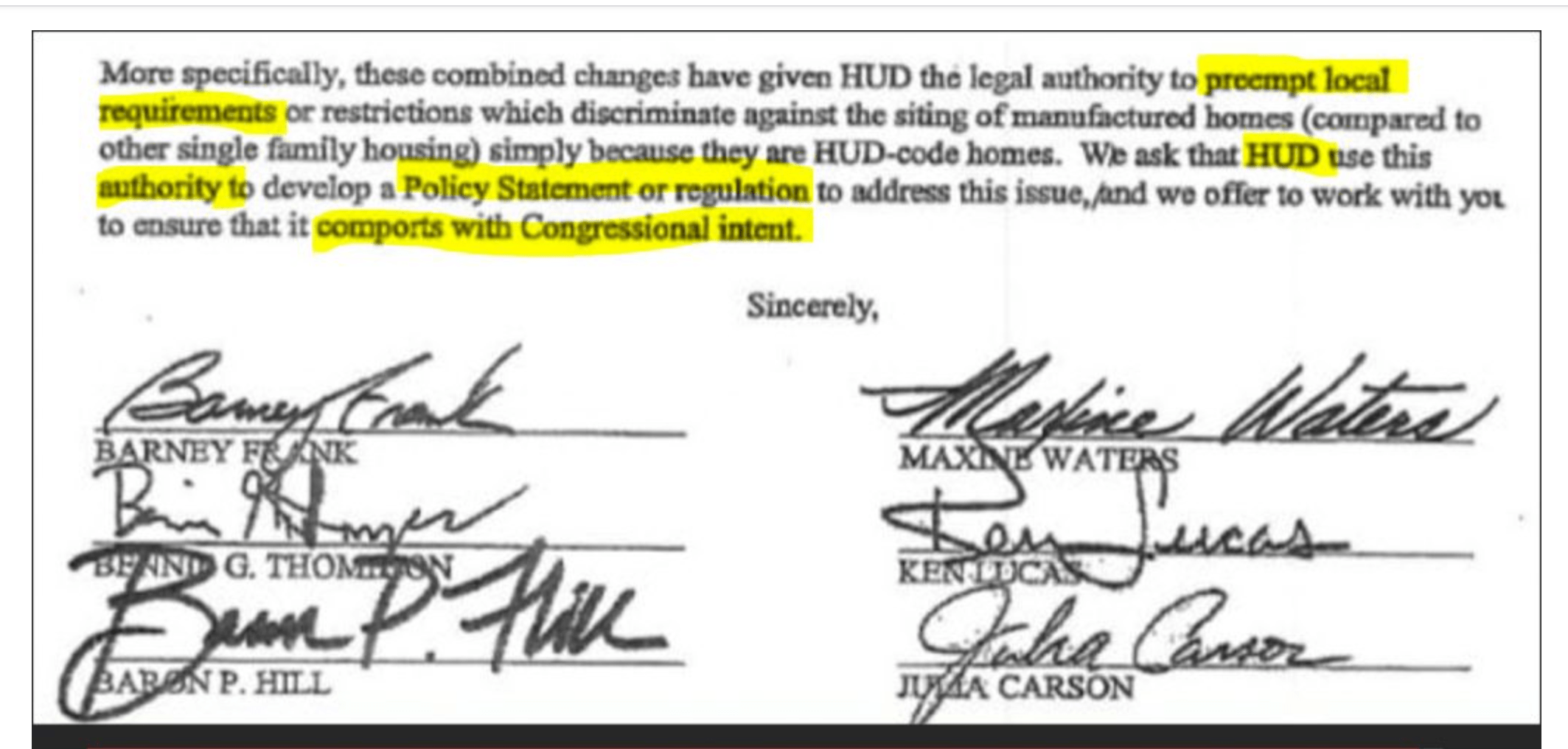
F) paper, MHI and MHARR seem to agree on this. But MHI has never sued to get this law enforced. MHARR has offered to team up with one or more MHI state affiliates to get the law enforced, but there were no takers.
G) Facts are what they are. If this sounds conspiratorial, there are federal laws that deal with that concern. The late William Proxmire aptly said that when you want to understand what is occurring in Washington, D.C. ‘there are no coincidences’ and ‘follow the money.’ Those are tried and true journalistic and investigators mantras, as you know.
H) In 2011 and 2012, Congress held hearings precisely because the MHIA of 2000, with a focus on its enhanced preemption provision, was not being enforced.
HOUSE FINANCIAL SERVICES COMMITTEE — SUBCOMMITTEE ON INSURANCE, HOUSING AND COMMUNITY OPPORTUNITY
| NOVEMBER 29, 2011 FIELD HEARING — DANVILLE, VIRGINIA — THE STATE OF MANUFACTURING HOUSING |
Hearing entitled “Implementation of the Manufactured Housing Improvement Act of 2000” |
https://financialservices.house.gov/events/eventsingle.aspx?EventID=401986
HUD’s witness – Henry Czauski – claimed the law was being enforced. Both MHI and MHARR witnesses denied that claim, while admitting there were a few occasions when enhanced preemption for HUD Code manufactured homes were enforced.
WITNESS LIST
- Henry S. Czauski, Acting Deputy Administrator for Manufactured Housing Programs, Department of Housing and Urban Development
- John Bostick, Chairman, Manufactured Housing Association for Regulatory Reform
- Edward Hussey, Immediate-Past Chairman, Manufactured Housing Association for Regulatory Reform
- Manuel Santana, Director of Engineering, Cavco Industries, Inc., on behalf of the Manufactured Housing Institute
I) But MHProNews has an on-the-record statement from the first administrator of HUD’s Office of Manufactured Housing Programs (OHMP), William “Bill” Matchneer, J.D. OHMP was established by the MHIA. Matchneer said that he could not get HUD’s Office of General Counsel to enforce federal preemption.
J) MHI had Dr. Carson addressing their trade group (which as a disclosure, I was a member of for several years, served on one of their boards, before we parted ways). But there is no evidence known that MHI ever asked Dr. Carson in person to enforce so-called “enhanced preemption.” There are comment letters by MHI that mention preemption, but since when do HUD Secretaries read through hundreds of comment letters? Restated, the evidence-based case can be made that MHI postures, preens, and palters without doing the common-sense things that would get good existing laws enforced.
K) The upshot? The possible motivation? Consolidation of smaller firms by larger ones. NPR reported (again) recently about Havenpark Capital, one of several MHI member brands that are accused by residents and advocates of being predatory. MHI has a “code of ethical conduct.” But our sources say there is no known example of that code being enforced. MHI has an antitrust statement. But there is no known example of the apparent antitrust violations being enforced.

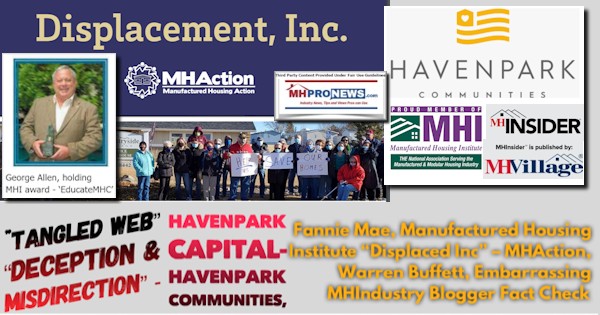
L) Minneapolis Federal Reserve researchers have alleged that HUD and builders are “sabotaging” manufactured housing as part of a monopolistic ploy. James A. “Jim” Schmitz and his colleagues came at this differently than Samuel “Sam” Strommen with Knudson Law. Strommen called what is occurring in manufactured housing a “Rube Goldberg Machine of Human Suffering.” Both Schmitz and his colleagues are cited in the report linked below that has Strommen’s entire heavily footnoted thesis. Strommen says this is a case of “felony” monopolization conspiracy, and specifically said MHI is part of the conspiracy.
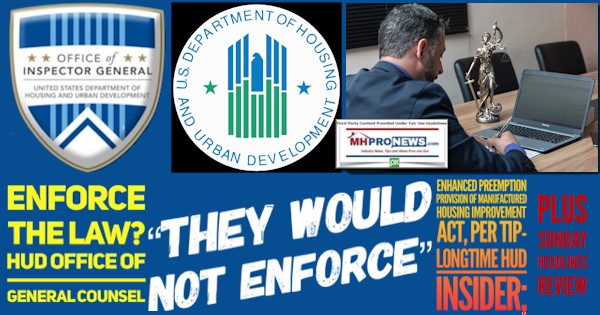
M) As a thought-provoking point. Some when they are first exposed to these fact and evidence patterns wonder, how could this go on for so long? One must keep in mind that in the 21st century alone, there have been numerous major scandals that went on for years before they were finally exposed and dealt with.
https://www.wnd.com/2021/05/solution-big-tech-oligarchs/
N) By keeping capital access limited, the larger players can slowly consolidate the smaller ones. By subtly thwarting the laws that would grow the industry (and thus solve the affordable housing crisis), the case can be made that MHI is benefiting the few at great cost to the many.
O) HBO’s Last Week Tonight with John Oliver did a satirical hit misnamed “Mobile Homes” in 2019. The terminology is off, but several of the troubling issues he raised are true enough. Oliver brought several of the predatory elements out. What Oliver did not do is say that a common thread is that these predatory firms are all MHI members.

P) Consider the recent SEC suit filed against MHI member Cavco Industries. It reads like a fictional novel. But it fits the fact pattern outlined above. Those pleadings by the SEC and related are unpacked below.
https://www.manufacturedhomepronews.com/masthead/project-saturn-code-name-monarch-sec-v-cavco-stegmayer-et-al-federal-suit-revelations-about-cavco-skyline-champion-other-manufactured-housing-brands-apparen/


Pride and Prejudice: The Truth About Manufactured Home Communities and Crime
NOTICE: 12.18.2021 There are other reports that will be added to this list.
Partial List of Mainstream Media with Evidence-based Concerns About Berkshire Hathaway Owned Clayton Homes, Their Related Lending.
- GuruFocus said “Warren Buffett Can’t Escape Unethical Strategic Moats,” their specific points are linked here.
- The Nation called it “The Dirty Secret Behind Warren Buffett’s Billions…” and specifies Clayton Homes among those using the strategic moat in ‘dirty’ ways.
- The Seattle Times in “Minorities exploited by Warren Buffett’s mobile home empire Clayton Homes” said that “Clayton’s grip on the lending market verges on monopolistic…”
- The Jacksonville Florida Times Union summarized the connection between the John Oliver viral hit video dubbed “Mobile Homes,” MHI, Clayton Homes, and their related lenders. That op-ed was first fact-checked by an editor, before it was published in multiple Florida newspapers.
- Forbes has an article that focuses on the racial bias and predatory businesses practices too. It is entitled “Warren Buffett’s Exploitative Mobile Home Investment.” Rephrased, there are sources across the left-right media divide that have highlighted problems with Clayton Homes, their business and lending practices for several years. Several of those have included a monopolistic angle.
- The Atlantic, mentioned along with IBIS World in our outline further above, noted that the independent retailers in manufactured housing were being rapidly eliminated/consolidated. They did not specify how that was being done, but stated the evidence based trends in a report linked here.
- In a column in American Banker, Doug Ryan with CFED (rebranded since then as Prosperity Now) had the headline: “Time to End the Monopoly Over Manufactured Housing.”

Partial List of Abbreviations from the GAO – Government Accountability Office – research
- AHS American Housing Survey
- CFO Chief Financial Officer
- CFPB Consumer Financial Protection Bureau
- DAPIA Design Approval Primary Inspection Agency
- FAR Federal Acquisition Regulation
- FEMA Federal Emergency Management Agency
- FHA Federal Housing Administration
- FHFA Federal Home Finance Administration
- GSE government-sponsored enterprises
- HERA Housing Economic Recovery Act 2008
- HMDA Home Mortgage Disclosure Act
- HUD Department of Housing and Urban Development
- ICC International Code Council
- IPIA Production Inspection Primary Inspection Agency
- IRC International Residential Code
- MHCC Manufactured Housing Consensus Committee
- MHS Manufactured Homes Survey
- NFPA National Fire Protection Association
- OMB Office of Management and Budget
- PATH Partnership for Advancing Technology in Housing
- PD&R Office of Policy Development and Research
- RHS Rural Housing Service
- SAA state administrative agency
- USDA Department of Agriculture
- VA Department of Veterans Affair
##
Note: As regular readers know, MHLivingNews and our MHProNews sister site have been engaged in and following the drama unfolding in Ayden, N.C.
Other related reports include the following.

Here on MHLivingNews, dozens of times a year, we lay out the facts and insights that some others are too unmotivated, agenda-driven, or otherwise uninformed to do. That’s what makes this and our business daily news sister site – MHProNews – the runaway leaders for authentic information about affordable housing in general, the politics behind the problems, and manufactured homes specifically. That’s a wrap on this installment of “News through the lens of manufactured homes and factory-built housing” © where “We Provide, You Decide.” © ## (Affordable housing, manufactured homes, reports, fact-checks, analysis, and commentary. Third-party images or content are provided under fair use guidelines for media.) (See Related Reports, further below. Text/image boxes often are hot-linked to other reports that can be access by clicking on them.)

By L.A. “Tony” Kovach – for MHLivingNews.com.
Tony earned a journalism scholarship and earned numerous awards in history and in manufactured housing. For example, he earned the prestigious Lottinville Award in history from the University of Oklahoma, where he studied history and business management. He’s a managing member and co-founder of LifeStyle Factory Homes, LLC, the parent company to MHProNews, and MHLivingNews.com. This article reflects the LLC’s and/or the writer’s position, and may or may not reflect the views of sponsors or supporters.
Connect on LinkedIn: http://www.linkedin.com/in/latonykovach
Recent and Related Reports:
The text/image boxes below are linked to other reports, which can be accessed by clicking on them.
 manufacturedhomelivingnews.com Manufactured Home Living News
manufacturedhomelivingnews.com Manufactured Home Living News

